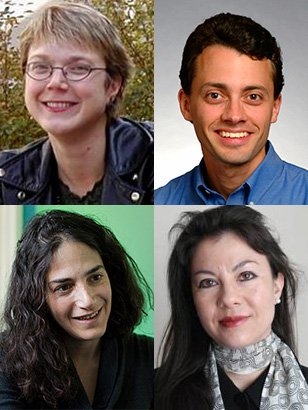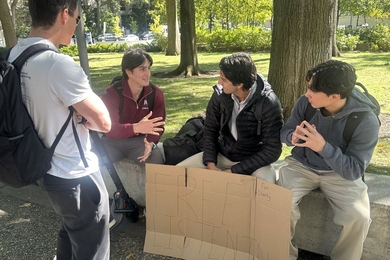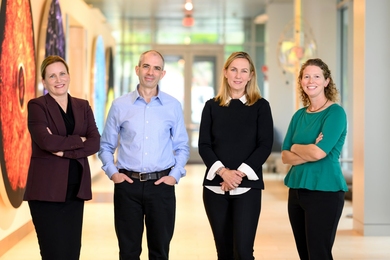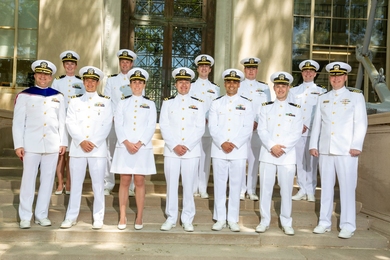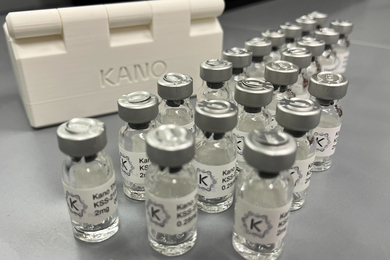
From left to right: Linda Griffith, Rob Miller, Laura Schulz and Emma Teng.
Four MIT professors have been named 2013 MacVicar Faculty Fellows for their outstanding undergraduate teaching, mentoring and educational innovation.
This year’s honorees are Linda Griffith, the School of Engineering Teaching Innovation Professor of Biological and Mechanical Engineering; Rob Miller, an associate professor of computer science and engineering; Laura Schulz, the Class of 1943 Career Development Associate Professor of Cognitive Science; and Emma Teng, an associate professor of China studies and the T.T. and Wei Fong Chao Professor of Asian Civilizations.
These professors bring to 45 the number of current MacVicar Faculty Fellows, part of a program established in 1992 to honor the life and devotion to teaching excellence of Margaret MacVicar ‘64, ScD ‘67, MIT’s first dean for undergraduate education and founder of the Undergraduate Research Opportunities Program (UROP). The 10-year fellowship provides an annual allowance in support of undergraduate teaching.
Provost Chris A. Kaiser selected the fellows in conjunction with an advisory committee of faculty and students chaired by Daniel Hastings, dean for undergraduate education.
To celebrate undergraduate education on this MacVicar Day, the Institute will host a symposium this afternoon featuring five MIT faculty members speaking on “Reimagining the MIT Classroom: Experiments with Digital Learning.” Hastings will introduce the new MacVicar Fellows and then moderate the symposium. Speakers will include Teng; Jesus del Alamo, the Donner Professor of Science in the Department of Electrical Engineering and Computer Science; Anette Hosoi, an associate professor of mechanical engineering and applied mathematics; Anne E. C. McCants, a professor of history; and Troy Van Voorhis, a professor of chemistry.
Today’s program will run from 2 to 4 p.m. in Bartos Theater (E15-070). A reception honoring the new MacVicar Fellows will follow from 4 to 5 p.m. in Bartos Lobby. The symposium and reception are open to the entire MIT community.
Linda Griffith
Linda Griffith received her BS in chemical engineering from the Georgia Institute of Technology in 1982, and her PhD in chemical engineering from the University of California at Berkeley in 1988. She was a postdoc in MIT’s Department of Chemical Engineering from 1988 to 1990, becoming an assistant professor in that department in 1991, an associate professor in 1996, and a full professor in 2002. Griffith joined the faculty of the Department of Biological Engineering in 1998, and the faculty of the Department of Mechanical Engineering in 2003.
Students view Griffith as a “rockstar” and a “dynamic force”; a colleague described her lectures as “extraordinary, flawlessly moving from engineering calculations to cell biology to medicine.”
“She entered the classroom each day a blur of energy and enthusiasm … ready to fill chalkboard after chalkboard with equations, stopping only to entertain us with colorful anecdotes,” one student wrote. “No matter how complex the topic, Linda made it look easy and interesting.”
“She would often ask us questions in class,” another student added, “and where possible, she would weave in the impact of what we do. … For me personally, making the relationship between core engineering principles and the impact that engineers could — and should — have on society was paramount.”
Griffith and Miller are among the Institute’s most dedicated researchers and educators, says Ian A. Waitz, dean of the School of Engineering and a MacVicar Faculty Fellow.
“Along with Linda’s remarkable research in biological and tissue engineering,” Waitz says, “she was a driving force behind the creation of MIT’s newest undergraduate major, biological engineering, which has served as a model for similar curricula around the world. Working with colleagues from across the Institute, she oversaw the creation of nine new subjects for the major, creating two of them herself from scratch. And while working toward the broad impacts that come with such innovations, Linda has throughout her career remained a trusted and dedicated advisor and advocate to her many students.”
Rob Miller
Rob Miller received his SB and MEng from MIT in 1995, and his PhD from Carnegie Mellon University in 2002. He joined MIT as an assistant professor in 2002, becoming an associate professor in 2006.
One colleague described Miller as “a fabulous teacher in all respects: in course development, in course management and organization, in hands-on pedagogy and engagement with students, and in inventing new ways to use technology to enhance education.”
Another wrote: “I think Rob embodies the ideal of an MIT teacher — caring, engaging, tirelessly working on behalf of the students, eliciting respect, admiration, and joy from the students.”
Students in Miller’s courses agree that his lectures are exceptional.
“In my six years at MIT,” one wrote, “Rob’s course was the only one whose lectures I felt could not be missed. I was absent for exactly one lecture due to travel for a job interview, and I still remember how genuinely disappointed I felt … his lectures always prompted such interesting discussion and the material was presented so well, I felt as though I had missed something.”
“Rob’s research projects — including a revolutionary crowd-based system for text editing and programming-code evaluation — may also have significant educational applications, with the potential to impact the lives and learning of students around the world as they are implemented on MITx,” Waitz says. “Similarly, the course he developed on user interface and design has been extremely successful with an entire generation of students who are now in industry shaping our interactive experiences on a daily basis.”
Laura Schulz
Laura Schulz earned a BA in philosophy from the University of Michigan in 1992, and an MA and PhD, both in developmental psychology from the University of California at Berkeley, in 2002 and 2004, respectively. She joined MIT as an assistant professor in the Department of Brain and Cognitive Science in 2005, becoming an associate professor in 2010.
Schulz’s colleagues call her “a brilliant, passionate, innovative and enthusiastic teacher” and “a caring and committed educator who is deeply engaged in undergraduate education at all levels.”
“She knows her undergraduates well, has them over to her house and welcomes them warmly into her life, meets with them about their work and takes them seriously as junior colleagues and human beings,” one wrote. “She has more undergraduate office hours than anyone else I know, and is regularly meeting with undergraduates outside her normally scheduled hours … she sets the highest example for MIT undergraduates on how to be a scientist, an educator and a person who is deeply committed to helping others develop themselves and their potential.”
“Dr. Schulz was undoubtedly the one professor who made the most lasting impact on my life,” one student wrote. “I felt like Dr. Schulz became one of my greatest mentors, supporters and advocates. We discussed my interests and goals, and together figured out a plan to help me get there.”
Marc Kastner, dean of the School of Science, cites Schulz’s teaching of 9.85 (Early Childhood Cognition), a key part of the undergraduate curriculum in the Department of Brain and Cognitive Science (BCS), as an example of her devotion to students.
“Her high expectations for students in this Communication Intensive (CI-M) course and her dedication to excellence in teaching have provided essential training in critical writing and analysis for BCS undergraduates,” Kastner says. “As of last spring, she had mentored an astounding 68 UROP [Undergraduate Research Opportunities Program] students, who were able to participate in her groundbreaking research into how children learn.”
Emma Teng
Emma Teng holds three degrees from Harvard University: an AB, received in 1989; an AM, received in 1992, and a PhD, received in 1997. She became an assistant professor in MIT’s Foreign Languages and Literatures section in 1998, and an associate professor in 2002. In 2012, she began a second appointment in the Institute’s History section.
Teng’s students describe her as “simultaneously … an instructor, a mentor, and a confidante.”
“I know of no other faculty member who appears always to be with a student — in her office, in the copying room, or just walking down the hallway,” one colleague wrote. “Professor Teng attracts students like a magnet. She is a mentor to many formally, and to many more informally.”
“Emma is a brilliant scholar whose energy, enthusiasm and talent for bringing scholars together enables her to inspire students and faculty to move beyond what is usually expected,” another colleague observed. “Her creativity gives others a model of how to think across disciplines, and her high standards keep us rigorous in our efforts.”
“Emma Teng embodies the best combination of qualities — top-notch research on Asian and Asian-American identities and histories with hands-on, deeply effective teaching and mentoring of students,” says Deborah K. Fitzgerald, Kenan Sahin Dean of the School of Humanities, Arts, and Social Sciences. “Whether in History, Foreign Languages and Literatures, or Women’s and Gender Studies, Emma puts it all together for MIT students. Her dedication to students and impact in the field make her an excellent MacVicar Fellow.”
